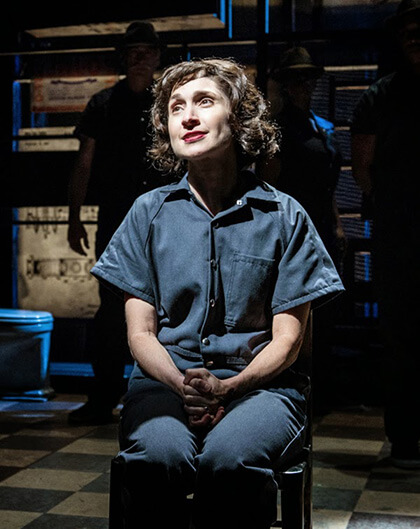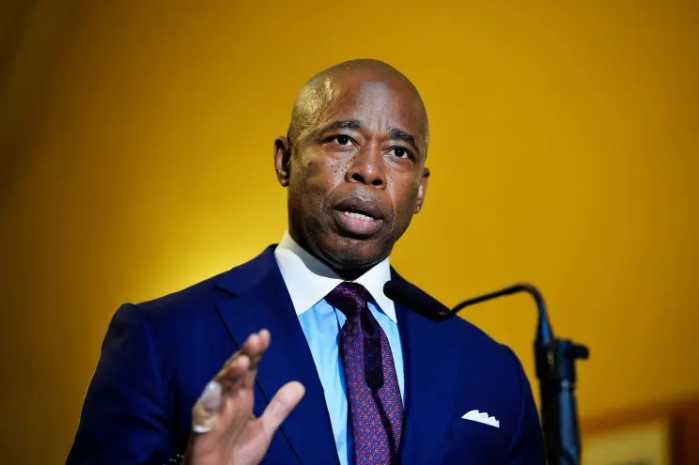Tracy Michailidis in the title role of “Ethel Sings,” at the Beckett Theatre through July 13. | RUSSELL ROWLAND
BY DAVID KENNERLEY | The tale of Julius and Ethel Rosenberg certainly is the stuff of heady theater. The married Jewish-American couple, Communist sympathizers who were sent to the electric chair in 1953 for sharing atomic secrets with the Russians, were caught up in one of the most sensational trials of the 20th century.
Yet while developing “Ethel Sings: The Unsung Song of Ethel Rosenberg,” the drama recounting the debacle, playwright Joan Beber and director Will Pomerantz were not content with creating a simple period piece. Instead, they added sardonic, Kander and Ebb-style musical numbers and fanciful, anachronistic flourishes in an effort to elevate the production.
The action unexpectedly jumps between the real and unreal, and there’s a mysterious, sassy Earth Mother that guides Ethel, occasionally dropping names from the future, like Michelle Obama.
New play revisiting infamous Rosenberg executions transcends mere historical drama
The result is a fascinating, albeit frustrating, conceptual piece of theater.
For the most part, “Ethel Sings” stays true to the historical facts. The play covers events starting in 1930, when Ethel was an aspiring singer and actress shunned by her mother. Later she meets Julius, a handsome activist and engineer, at a Young Communist League gathering and they fall in love, marry, and have two sons. Because Julius refuses to mask his “Commie” sympathies, he is fired from a series of jobs.
Before long, Julius and Ethel are charged with espionage for supplying classified plans to the Russian government, and the drama poses a pair of urgent questions: Did Ethel actually type the notes detailing the bomb construction for Julius, making her an accomplice? And why won’t she name names to avoid execution?
It comes as no surprise that her idol is none other than the martyr Saint Joan. “To sacrifice what you are and to live without belief, that is a fate more terrible than dying,” says Ethel.
Thousands protested their death sentence. While solid evidence supports Julius’ culpability, Ethel’s supposed role in the plot is open for debate even today.
The austere set, by John McDermott, is comprised of an ingenious metal framework that not only evokes a New York courtroom, Sing Sing prison, and various tenements, but also features rotating signs that announce the date or place of the action, hand-turned by the actors. It’s a refreshing, low-tech alternative to the usual projected titles.
If only the rest of the production showed similar restraint. The unwieldy ensemble of ten actors — largely onstage for the entire proceedings — play some 40 characters and overwhelm the tiny Beckett Theatre on Theatre Row.
The performances are all over the map, though the leads are fairly solid. Tracy Michailidis is quite convincing as Ethel, adding complex layers of warmth and vulnerability to her stoicism. More than just an angry traitor, Julius is portrayed by Ari Butler as an intelligent, ardent idealist who gets carried away with his politics. Butler makes it perfectly plausible that Ethel would fall so deeply under Julius’ spell and stand by him.
“It’s up to the intelligentsia of this country to blast the party in power,” insists Julius, sounding oddly like the malcontents in the current Tea Party movement.
The supporting cast standout is Kevin Isola as the odious Roy Cohn, the closeted homosexual prosecutor who dooms the duo to the electric chair. Isola’s forceful delivery blows away anyone else on the stage. “I’d turn in my own mother if she were a Commie,” growls Cohn, and we have no reason to doubt him.
To be sure, many of the ideas about American identity, fear-mongering, scapegoating, and media frenzy resonate just as potently today.
Perhaps the most surprising aspect of this challenging drama with musical excursions is that it’s more than just a spy thriller or a slice of history. At its core, “Ethel Sings” is a love story. The play fearlessly reveals its pro-Ethel stance, suggesting she was guilty only of true love, not treason.
ETHEL SINGS: THE UNSUNG SONG OF ETHEL ROSENBERG | Undercover Productions | Beckett Theatre at Theatre Row | 410 W. 42nd Street | Tue.-Thu. at 7 p.m.; Fri.-Sat. at 8 p.m. | Wed., Sat. at 2 p.m.; Sun. at 3 p.m. through Jul. 13 | $60.25; telegcharge.com or 212-239-6200



































